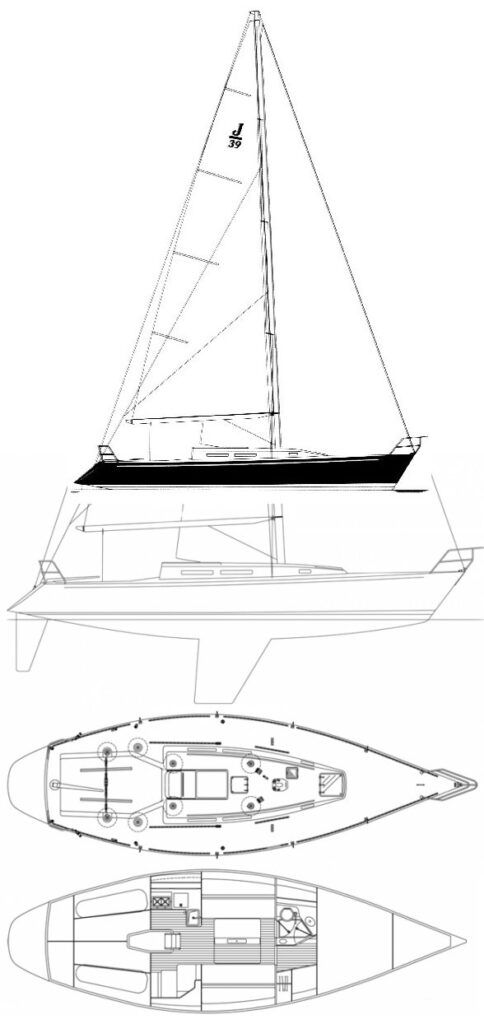The J/39 stands as a notable example of J Boats' commitment to crafting vessels that seamlessly blend spirited sailing performance with comfortable cruising capabilities. Designed by Rod Johnstone, the J/39 emerged from the renowned J Boats lineage, known globally for its "accessible performers" that excel on the racecourse while remaining manageable for family and friends. With a length overall of just over 39 feet, she represents a design ethos focused on efficient hulls and balanced rigs, aiming to deliver a rewarding sailing experience.
J/39 Information, Review, Specs

- Make
- Model
- Number Built
- 25
- Production Year(s)
- 1989 - 1997
History and Design
The J/39 was introduced in 1989, marking J Boats' foray into the realm of IMS (International Measurement System) oriented designs, and remained in production until 1997. Following the established J Boats tradition, the J/39 was an in-house design by Rod Johnstone, a hallmark of the company's consistent brand aesthetic and performance profile. J Boats, with production partners like TPI Composites in the United States, was instrumental in utilizing advanced fiberglass construction techniques to build these competitive yet user-friendly sailboats. The design philosophy behind the J/39 aimed to combine comfort with speed, catering to sailors who desired a boat capable of performing well in racing while still offering practical amenities for cruising.
Sailing Performance and Handling
The J/39's design ratios underscore its performance-oriented nature. With a Sail Area to Displacement (SA/Disp) ratio of approximately 23.22, the J/39 possesses ample sail power relative to its weight, indicating strong performance potential, particularly in lighter air conditions. A Ballast to Displacement (Ballast/Disp) ratio of around 0.457 speaks to its inherent stiffness and stability, suggesting the boat can stand up to a significant amount of wind without excessive heeling. Furthermore, a Displacement to Length (Disp/LWL) ratio of approximately 167.75 places the J/39 firmly in the lighter, more performance-oriented category for its size.
Anecdotal reports corroborate these figures, with the J/39 consistently described as a "very fast" vessel that performed well against "exotic IMS competition" on the racecourse. Many consider the J/39 to be "one of the best J's built," praised for its fair, smooth hull lines and overall speed. Its balanced rig and efficient hull shape contribute to a responsive and engaging handling experience in various sea states.
Accommodations and Layout
While the J/39 was conceived with racing in mind, it nonetheless offers a functional and thoughtfully arranged interior designed to provide comfort for cruising. The interior layout is often described as "pretty well laid out" despite leaning towards a more "minimalist" aesthetic, typical for IMS-oriented designs of its era. The classic interior arrangement typically features a central section encompassing a well-equipped galley, comfortable salon settees, and a dedicated chart table or navigation station. Moving forward, an intermediate section commonly houses the head (marine toilet), leading to a V-berth in the bow. Information on specific headroom figures is not consistently available, but the overall design prioritizes efficient use of space, reflecting J Boats' blend of performance and practicality.
Owner's Perspectives
Owners frequently laud the J/39 as a well-built and capable sailboat, often citing its impressive performance and solid construction as key strengths. It's considered by some to be "one of the best J's built," indicating a high level of owner satisfaction with its sailing characteristics. However, like any vessel, some common issues have been noted over time. Recurring concerns among owners can include maintenance related to rudder bearings, engine mounts, and the engines themselves. Despite these potential considerations, the J/39 generally maintains a reputation for being an attractive boat from a reputable builder, often representing good value in the used boat market.
Measurements
Construction & Hull
- Construction Material
- Fiberglass (Solid)
- Hull Type
- Monohull Sailboat
- Keel Type
- Fin
- Rudder
- 1x Spade
- Ballast
- 5900 lbs (Lead)
- Displacement
- 12900 lbs
- Water Capacity
- -
- Fuel Capacity
- -
Engine
- Engine Make
- Yanmar
- Engine Model
- —
- Engine Type
- —
- Engine HP
- 27
- Engine Count
- 1
- Drive Type
- —
- Fuel Type
- Diesel
Rig & Sails
- Rig Type
- Masthead Sloop
- P (Main Luff)
- 47.2 ft
- E (Main Foot)
- 16.3 ft
- I (Foretriangle Height)
- 53.5 ft
- J (Foretriangle Base)
- 15.5 ft
- Forestay Length (est)
- 55.7 ft
- Main Sail Area
- 384.68 sqft
- Foretriangle Sail Area
- 414.63 sqft
- Total Sail Area (Reported)
- 799 sqft
- Total Sail Area (Calc)
- 799.31 sqft
Dimensions
- LOA
- 39.42 ft
- LWL
- 32.5 ft
- Beam
- 12.42 ft
- Draft
- 7.25 ft
- Max Headroom
- -
- Air Draft
- -
Calculations
- Hull Speed
- 7.64 kn
- Pounds per Inch Immersion
- 1